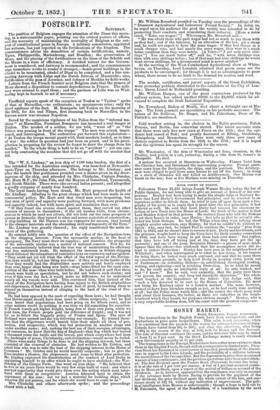MGR COURT OF POLICE.
Policeman Times 21,235 brings Joseph Warner Henley before the bar of Public Opinion, for not being able to give an account of himself or his con- nexions. Henley had been trying to make the simple folks at Banbury be- lieve that Lord Derby's Government had principles, and he resorted to an ingenious artifice to delude them : he tried to pass off upon them such a bio- graphy of his party as to imply that it must have the best principles, it had behaved so well. He said that Lord Derby had resisted the summary in-
Loon of new Peers into the House of Lords : the truth of the matter is that rd Stanley helped in that process. He resisted.those who told the Bishops to set their houses in order, says Henley : fact tells us that he actually abo- lished ten Irish Bishops. He left the Whigs when they were talking about naughty secular education, says Henley, for that he couldn't do without re- ligion : why, says fact, he helped Peel to continue the "secular " plan from 1841 to 1845, and he doesn't dare to reverse it now. Derby and his friends, said the prisoner, fought hard to keep the Corn-laws for their country connexions in 1846, and have been trying to get them back ever since : fact replies, that they have left off trying just at the time they have got the op- portunity; and one of the gang, Benjamin Disraeli—a person of more intel- ligence than the others—has confessed that his accomplices never did in- tend to restore Protection ! Henley has been seen in the neighbourhood of Whitehall ; and when interrogated as to what he was doing, or his reasons for being there, he looked very much confused, and said that he came there on conscientious grounds, to help Lord Derby in keeping extra Lords out of Parliament—in defending Bishops—in establishing theological reading, writing, and ciphering—and in restoring Protection. As to what he meant to do, he could make no intelligible reply at all : he only winked, and said "I know." But he said, very earnestly, that the party were there "to govern the country, and keep out disorderly characters." The whole court laughed at the impudence of the fellow. The Judge said, that "such a tale deserved to be sent to the House of Correction. He must not bring his Banbury cakes to a London market. The man, however, seemed to .have been harmless enough as yet, as he had really done nothing at all : but the Police must watch him ; and the sooner the whole gang were sent about their business, the better, as, there are valuables in the neigh- bourhood which they haunt, for purposes obvious enough." Henley, who is a very respectable-looking man, left the court with the greatest composure.


























 Previous page
Previous page